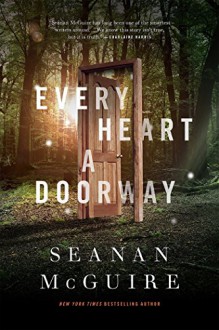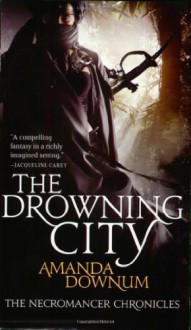
Eleanor West's Home for Wayward Children is a special place, one of several worldwide, for children and teens who briefly traveled to magical other worlds. Their parents could no longer understand them or deal with them. Maybe they'd never been able to. They thought their children had been kidnapped, or had run away, that they were now suffering from some kind of trauma or delusion. Eleanor promised she'd help them try to get better, when what she really intended to do was give them a place where they could be themselves and meet others like them.
Nancy is the newest arrival. She longs for the world she visited, the Halls of the Dead, and she's sure she'll find her way back one day. In the meantime, Eleanor's boarding school seems like a better alternative than living with her parents, who keep trying to dress her in rainbow colors. Unfortunately, she's not even completely settled in before someone ends up murdered.
I've been wanting to read this since well before it was published, when I first heard that the main character was asexual. I got even more excited when I learned that all the characters were all essentially former “portal fantasy” protagonists. I love “transported to another world” stories, and I figured I'd enjoy reading something starring characters who'd all been through that.
I'll start with the good. Like I said, I loved the setup. The descriptions of the various worlds the characters had been to were wonderful, and I really wished I could have seen them in those worlds. I'd happily read prequel books/stories in which Kade was back in Prism, or Sumi was back in Confection, or Christopher was meeting the Skeleton Girl for the first time. There were some great lines here and there, too. The description of Eleanor's boarding school, and what she wanted it to accomplish, made me feel a bit weepy.
I appreciated that Nancy was asexual (specifically romantic asexual) and that Kade, who she felt a little drawn to, was trans (by the way, this is a bit of a spoiler, but I'm going to say it anyway: the hints of potential romance go nowhere). Kade had gone to his world as a princess and, while there, realized that he was really a prince. Unfortunately, he was cast out because too many others in the world couldn't accept that he was really a boy. Considering that the “other worlds” were presented as places that called to some part of a particular individual's heart, it seemed enormously cruel that Kade's “other world” couldn't accept him as he really was. He appeared to have come to terms with it since arriving at Eleanor's school, but still. Ouch.
I guess now's a good time to start talking about the things I didn't like. Most of it comes down to this: I felt that this story was trying to do too much. It was only 169 pages, and there was so much there that either should have been expanded upon or ruthlessly cut.
As far as the murder went, I guessed the killer's identity fairly quickly, just based on who'd have had the background necessary to do it, as well as the murder mystery rule that states that the person everyone accuses usually isn't the real killer. I was briefly distracted by one possible other suspect, but then the story came right back around to my original choice. I'm normally terrible at solving murder mysteries, so I'm going to conclude that this one wasn't very good.
All the people who were killed were characters that readers were familiar with to varying degrees – people Nancy had spoken to or been friendly with. And yet I felt almost nothing when their bodies were found, and I think it's because there just wasn't enough time for them to become solid, real-feeling people.
Even Nancy could have used...more. She'd think or talk about her time in the Halls of the Dead, or the skills she learned while she was there (being literally still as a statue), or her asexuality, and that was pretty much it. Speaking of her asexuality, it felt like McGuire couldn't quite decide how to write her. She was very open about her asexuality with Sumi, her new roommate, and even took the time to explain it. Okay. But then when she was alone with Kade, looking for Jill, she started to hope that he'd want to kiss her, and then worry that she'd have to explain that she wasn't interested in going beyond kissing. First, this was a really odd time to be thinking about kissing. There was still a killer on the loose, they couldn't find Jill, and they'd just spent some time dealing with a corpse (granted, Nancy was pretty used to death). Second, what, she'd felt okay blurting all that info out to Sumi but was worried about doing the same with Kade?
I brushed it off as being due to her feeling differently about Kade than she did about Sumi, meaning that there was more at stake. However, then there was a cozy little cocoa drinking party, during which Nancy told Kade and everyone else in the room that she was asexual. Zero evidence of worry or discomfort on her part. Also, the way she explained it was odd:
“That's not what I mean. I don't want to go on dates with girls, either. I don't want to go on dates with anyone. People are pretty, sure, and I like to look at pretty things, but I don't want to go on a date with a painting.” (132)
The asexual spectrum is extremely varied, so maybe I'm wrong, but this didn't seem to fit with what Nancy had said about herself earlier. As far as I could tell, she'd be perfectly fine with dating someone, just not with having sex with them. This part of the text seemed to be conflating dating and sex.
There were things in the story that were repetitive, or just...off. Eleanor was working with the authorities after the death of the first person, but those authorities never once entered the boarding school or talked to the teens there. That spoke of some serious connections on her part, but then the next deaths had her worrying about the fate of the school. There were repetitive bits of text, like Nancy thinking about how strong her muscles had to be in order to keep her so perfectly still and then Jack, later on, mentioning the exact same thing. And the ending... I felt like I'd gotten the wind knocked out of me. It came so soon after a paragraph that laid out a completely different path.
I could write more. I wondered about the characters' other worlds, and how much they affected vs. reflected their innermost selves. I had questions about what Eleanor really hoped to accomplish, and whether her school did some of its students more harm than good. I was uncomfortable with the way some of the things the characters had picked up from their other worlds were presented, like when Nancy insisted that her desire not to eat every day or to subsist entirely off of cottage cheese, grapes, and melon wasn't an eating disorder. Maybe not in the Halls of the Dead, but she wasn't there anymore and was presumably still human.
I don't know. I wanted to like this a lot more than I did. I've seen indications that it might end up being part of a series, and if McGuire ever writes a full-length related novel, I'd like to read it. However, Every Heart a Doorway, on its own, was kind of disappointing. Maybe I just got too excited and expected too much.
(Original review, including read-alikes, posted on A Library Girl's Familiar Diversions.)

 Log in with Facebook
Log in with Facebook 








